Sailing is an exhilarating experience, but accidents can happen. Having a few natural remedies at hand can make all the difference when dealing with the hazards of sailing and the weather and climate conditions that can favor certain skin diseases and infections. Here are ten essential remedies to include in your first-aid kit on board, and not only...
Calophylla inophylla oil: the skin repairer
Calophylla inophylla oil is the ideal companion for skin injuries such as scrapes or cuts caused by sharp equipment. Thanks to its healing, anti-inflammatory and antiseptic properties, it promotes rapid skin regeneration. Apply a few drops to the affected area to speed up the healing process.
Calophylla Inophyla vegetable oil also inhibits certain inflammation factors and mediators. As a result, this vegetable oil can be used to relieve pain resulting from excessive muscular effort, whether during sailing or on land. It is particularly effective when repetitive movements, such as frequent stooping, become hard on the joints.
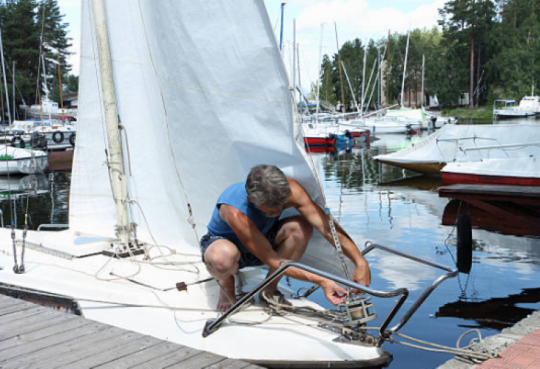
For chilblains caused by cold temperatures at sea, apply Calophylle Inophyle oil, which promotes blood circulation and helps warm the skin.
We recommend using cold-extracted oil.
Tea tree essential oil: the versatile antiseptic
In a damp, salty environment, a small open wound can quickly turn into a skin infection. If this happens to you, tea tree essential oil is a powerful antiseptic with antibacterial and antifungal properties. In the event of injury or skin irritation, dilute a few drops in coconut oil and apply the mixture to prevent infection.
Do not exceed the doses recommended by your pharmacist. Never use undiluted.
Clove: to relieve toothache
Clove, with its analgesic and anti-inflammatory properties, has traditionally been used as a natural remedy to relieve the pain associated with toothache. This small dried floral bud contains eugenol, a compound with local anesthetic properties that can help numb the painful area. Toothache at sea doesn't wait. To relieve tooth pain quickly, it's often enough to place a clove on the affected tooth or chew it gently to release its essential oils. What's more, the eugenol in cloves can also help reduce gum inflammation and promote temporary relief.
Ravintsara essential oil: immune support at sea
Life at sea can weaken the immune system. Ravintsara essential oil is renowned for its immune-boosting properties. In times of fatigue or stress, a few drops in a spoonful of honey will support your well-being.
Do not exceed the doses recommended by your pharmacist. Never use undiluted.
Aloe vera: the natural moisturizer
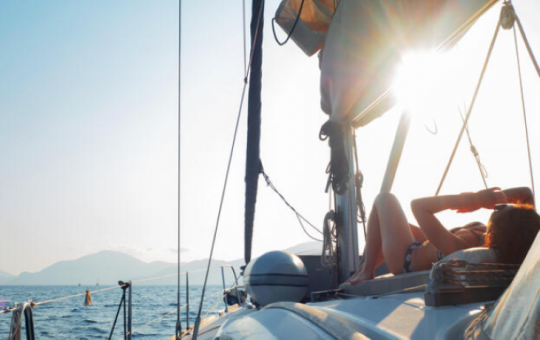
Long sunny days can sometimes leave their mark on the skin. Aloe vera, with its soothing and moisturizing properties, is a valuable ally in the event of sunburn. Apply aloe vera gel to the affected skin for immediate relief and faster recovery. Orally, take pieces of the plant for instant hydration. Having some on board doesn't mean you don't need preventive sun protection.
Aloe vera doesn't need much water to survive; its ability to retain moisture makes it an ideal ally on board.
Coconut oil: the on-board all-rounder
Coconut oil is a versatile must-have. In addition to its skin-moisturizing properties, it can be used to treat minor burns such as those caused by contact with a halyard spinning too fast, or to nourish the skin after exposure to the sun.
Coconut oil can soothe the skin while providing a protective barrier, but it can also be used in cooking. Its edible use makes it versatile for on-board preparations. Coconut oil is one of the few oils that can be used for high-temperature cooking, particularly frying.
The fatty acids present in coconut oil also act as effective repellents against various types of blood-sucking insects. By deterring not only mosquitoes and horseflies, but also ticks and bedbugs, this oil provides complete protection against these pests, particularly in tropical regions. This can be particularly useful if one or two mosquitoes have managed to find a loophole in your mosquito net...

We recommend using cold-extracted oil.
Manuka honey: the versatile healer
Manuka honey, with its exceptional antibacterial and anti-inflammatory properties, is an indispensable ally on board. In the event of a burn or deep cut, such as that caused by a kitchen knife slipping while preparing your fish fillet, or by spilled hot water, apply a thick layer of Manuka honey to the affected area before bandaging to minimize the risk of infection. Its viscous texture also creates a natural protective barrier, promoting optimal and rapid healing.
By consuming it, honey helps boost your immunity to cold snaps and infections. It also soothes sore throats, while offering a delicate sweetness to be enjoyed straight from the spoon.
UMF is a rating system developed in New Zealand to assess the quality of Manuka honey in terms of antibacterial properties. The higher the UMF number, the higher the MGO concentration. Higher levels of MGO are often associated with stronger antibacterial properties. Manuka honey with a UMF of 10 or more is generally considered therapeutic.
Ginger: the natural seasickness remedy
Simply chew fresh ginger or cut two slices and apply to each bandaged wrist to alleviate nausea at sea. Its rapid efficacy makes it a natural and affordable way to combat the symptoms of seasickness, enabling sailors to enjoy their voyage in complete peace of mind.
In addition, ginger contains bioactive compounds, notably gingerols and shogaols, which are responsible for its stimulating properties. It is often recommended to help boost energy, improve concentration and relieve fatigue. It can help with night shifts!
Peppermint essential oil: for gastrointestinal comfort
Peppermint, with its soothing and refreshing properties, can be a valuable ally when sailing. Menstruating women can find relief from symptoms such as abdominal cramps by drinking peppermint tea or massaging their stomachs with a neutral oil to which a few drops of tea tree essential oil have been added.

Peppermint's anti-nausea properties may also be beneficial for those prone to seasickness-related discomfort.
In addition, peppermint can help relieve stomach and abdominal discomfort, which can be particularly useful in cases of constipation, a problem that can be exacerbated during long sea crossings, or overly copious snacks.
Do not exceed the doses recommended by your pharmacist. Never use undiluted.
Arnica: an ally for blows and bruises
Arnica, with its recognized properties for relieving bruises and contusions resulting from an incorrect hand position on a winch, for example, or muscular pains, proves to be an invaluable remedy when sailing.

In the event of a blow or shock, applying an arnica-based gel or cream to the affected area can bring rapid relief. This medicinal plant is prized for its anti-inflammatory properties, which help reduce swelling and ease the pain associated with minor injuries. Remain vigilant, however, and watch out for the boom when tacking or gybing!
As always, we recommend testing these remedies with caution, taking into account your own reactions.
In the event of aggravation, we recommend that you consult a health professional as soon as possible, either ashore or by any other means of communication available on board, for appropriate diagnosis and treatment.
Choosing methods that suit your own tolerance and preferences can help make browsing more enjoyable.
